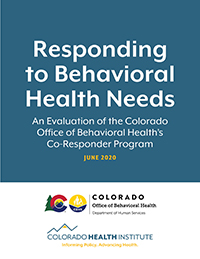Responding to Behavioral Health Needs

This shift has come in response to the number of people involved with the criminal justice system who have behavioral health and substance use issues. In Colorado, for example, 35 percent of the inmate population has a mental health need, and 74 percent has a substance use disorder.
The Colorado Co-Responder Program, administered by the Colorado Department of Human Services Office of Behavioral Health (OBH), supports communities that want to take a different approach to calls with a suspected behavioral health component. Over the past two years, OBH has granted funding in 25 counties to implement co-responder teams of officers and behavioral health professionals. However, due to staffing needs and start up delays, only some programs have been operational for the whole two years.
Although relatively new, these programs are already demonstrating positive outcomes for law enforcement and people with behavioral health conditions. The goals are to prevent unnecessary incarceration and hospitalization of people with behavioral health conditions, identify opportunities to provide alternative community-based care, and to return law enforcement officers to one of their primary functions — patrolling the streets.
The Office of Behavioral Health contracted with the Colorado Health Institute (CHI) to evaluate eight of the Co-Responder Program’s first two years.
Evaluation highlights include:
• Co-responder teams contacted between 16 and 103 individuals per month during response calls from August 2018 to August 2019. Overall, the co-responder teams responded to 4,357 calls.
• Over time, co-responder teams were more likely to report success in diverting community members from formal actions (arrests, mental health holds, and emergency department transports).
• Co-responder teams were more likely to connect with and effectively serve community members in need of support over time.
• The co-responder program improved interactions between law enforcement and community members.
Co-responder programs have realized many successes. But CHI’s evaluation also identified barriers to implementing the model, ranging from a lack of policy alignment between law enforcement and behavioral health providers, data collection challenges, and limited resources to increase staff.
This evaluation has limitations, given the newness of the program in Colorado. The initial data available were aggregate results of co-responder team activities rather than individual-level outcomes, such as data on how the co-responder program impacted each person served. A lack of client-level information and an absence of data on costs associated with services detracts from a full understanding of the costs and benefits of the program.
In response, the OBH team has improved and advanced data collection efforts. Over the past six months, OBH has created a new tool that collects data on individuals who are served by co-responders. This information includes the location of each individual after an emergency call or if the co-responder was able to contact the individual with a follow-up call. Better data allows for a deeper understanding of individual outcomes, including for people who frequently interact with emergency services. As the program continues to expand and adapt to community needs, OBH will provide more robust data to illuminate the programs’ impacts. This will be supported by ongoing evaluation efforts through February 2021.

